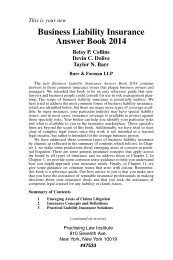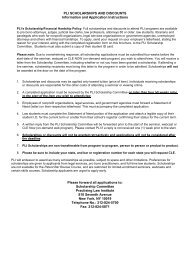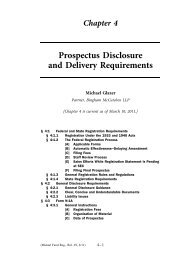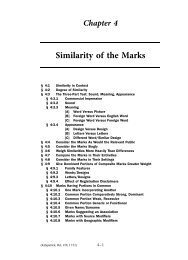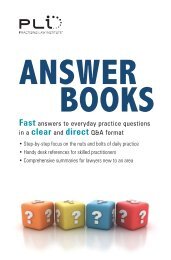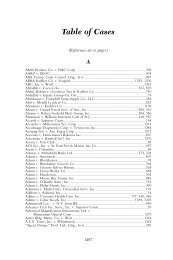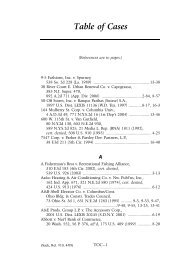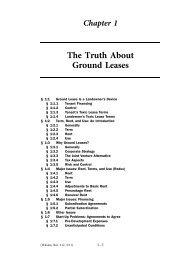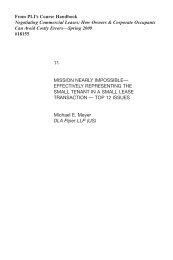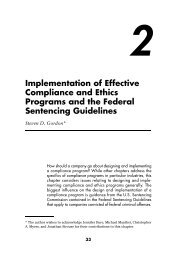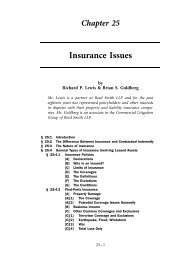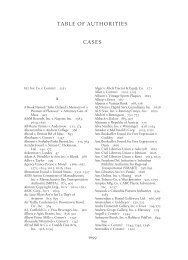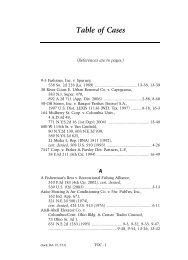Breach of Fiduciary Duty
Breach of Fiduciary Duty
Breach of Fiduciary Duty
Create successful ePaper yourself
Turn your PDF publications into a flip-book with our unique Google optimized e-Paper software.
<strong>Breach</strong> <strong>of</strong> <strong>Fiduciary</strong> <strong>Duty</strong> § 7:1.4<br />
Under ERISA a person is a fiduciary with respect to an employee<br />
benefit plan to the extent:<br />
(i) he exercises any discretionary authority or discretionary control<br />
respecting management <strong>of</strong> such plan or exercises any authority or<br />
control respecting management or disposition <strong>of</strong> its assets, (ii) he<br />
renders investment advice for a fee or other compensation, direct<br />
or indirect, with respect to any moneys or other property <strong>of</strong> such<br />
plan, or has any authority or responsibility to do so, or (iii) he has<br />
any discretionary authority or discretionary responsibility in the<br />
administration <strong>of</strong> such a plan. 61<br />
An accountant who does no more than perform the normal role<br />
<strong>of</strong> an accountant or <strong>of</strong> a fund auditor 62 is not an ERISA fiduciary. 63<br />
Indeed, the role <strong>of</strong> an independent auditor is “fundamentally at<br />
odds with any notion that such an accountant would be a plan<br />
fiduciary.” 64<br />
Where, however, an accountant renders individualized investment<br />
advice to an employee benefit plan on a regular basis, the accountant<br />
may be found to be an ERISA fiduciary. 65 In addition, where an<br />
accountant goes beyond the normal role <strong>of</strong> an accountant and assumes<br />
management or administrative responsibilities involving the exercise<br />
<strong>of</strong> discretion, the accountant may be a fiduciary. For example, an<br />
accountant who has authority to pass upon the validity <strong>of</strong> claims or to<br />
implement plan policy with respect to investments or benefits may be<br />
61. Id. § 1002(21)(A).<br />
62. See id. § 1023(a)(3)(A) as to the role <strong>of</strong> the fund auditor.<br />
63. See ERISA Interpretive Bulletin 75-5, 29 C.F.R. § 2509.75-5 (1993)<br />
(accountants performing their usual pr<strong>of</strong>essional functions not ordinarily<br />
considered fiduciaries); Yeseta v. Baima, 837 F.2d 380, 385 (9th Cir. 1988)<br />
(accountant who reviewed books <strong>of</strong> and prepared financial statements for<br />
plan was not an ERISA fiduciary); Pension Plan <strong>of</strong> Pub. Serv. Co. v. KPMG<br />
Peat Marwick, 815 F. Supp. 52, 54–55 (D.N.H. 1993) (dismissing breach <strong>of</strong><br />
ERISA fiduciary duty claim; no allegation that defendant performed in any<br />
capacity other than independent outside auditor).<br />
64. Painters <strong>of</strong> Phila. Dist. Council No. 21 Welfare Fund v. Price Waterhouse,<br />
879 F.2d 1146, 1150 (3d Cir. 1989).<br />
65. See 29 C.F.R. § 2510.3-21(c) (Definition <strong>of</strong> “<strong>Fiduciary</strong>”) (setting out when<br />
a party will be deemed to be rendering investment advice). Compare<br />
Sheldon Co. Pr<strong>of</strong>it Sharing Plan and Trust v. Smith, 828 F. Supp. 1262,<br />
1281–83 (W.D. Mich. 1993) (granting partial summary judgment against<br />
accounting firm that served as investment manager for plan; embezzlement<br />
by partner <strong>of</strong> firm was a breach <strong>of</strong> ERISA fiduciary duties by firm)<br />
with Brown v. Roth, 729 F. Supp. 391, 396–98 (D.N.J. 1990) (plaintiff<br />
failed to carry burden <strong>of</strong> coming forward with facts to show that accountant<br />
provided individualized investment advice to fund; summary judgment<br />
granted for defendants on ERISA claims).<br />
(Goldwasser & Arnold, Rel. #14, 10/11)<br />
7–13



